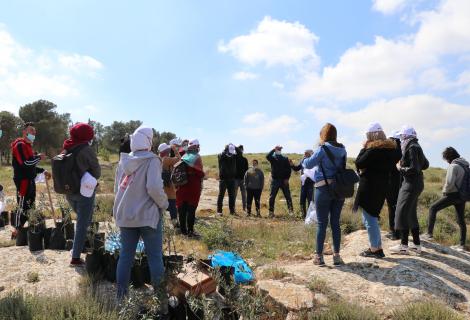Young Volunteers Show Solidarity with Confiscated Lands with Planting Olive trees

Young Volunteers Show Solidarity with Confiscated Lands with Planting Olive trees
25 Palestinian young people commemorated the Land Day by extending solidarity to Palestinian villagers of Twaneh village located in the south of Hebron governorate in the West Bank. Young people planted olive trees in this village as a stand against land confiscation and home demolitions. This initiative was conducted on Land Day which falls on 30th of March every year. It commemorates the killing of six Palestinians and the injuring of 70 others by Israeli gunfire in Nazareth in 1976 inside Green Line of 1948–49 during protests against Israeli policy of land confiscation.
(photo of Palestinian on her land in the village of Twaneh in south of West Bank )
Through its programme “Civil and Democratic Participation of Palestinian Youth” in partnership with Alternative Information Center (AIC), this youth initiative was supported to connect youth with ongoing issues faced by Palestinian people and strengthen resilience of Palestinian villagers in their lands by providing resources for villages to plant trees that are indigenous to Palestine's natural environment and agricultural life.
(Photo of youth while they are volunteering to plant olive trees to help Palestinian farmers on the occasion of Land Day in Twaneh in the south of West Bank)
Asmaa’ Abu Aisha is a young Palestinian woman highlight her participation in this initiative saying: “supporting our people in Palestinian villages with planting olive trees promotes the role of youth in strengthening the belonging of people to their lands and olive tree symbolizes to our ever existence in Palestine”.
(photo of Aseel while she is volunteering in planting olive trees are volunteering to plant olive trees to help Palestinian farmers on the occasion of Land Day in Twaneh in the south of West Bank)
Aseel Najajreh is a young Palestinian woman expressed her happiness towards this activity saying: “we headed to this village to support the existence and steadfastness of its people on their threatened lands”.
Hafez Al-Herni is a Palestinian resident of Twaneh “planting olive trees on our targeted lands by Israeli settlers will support our resilience in our village that is located adjacent to an Israeli settlement. The newly planted olive trees will replace olive trees that were uprooted by Israeli settlers”
(photo of Hafiz while he is planting olive trees on his threatened land in on the occasion of Land Day in Twaneh in the south of West Bank)
Recent reports issued by Israeli organisations of B’Tselem and Kerem Navot o revealed that the Israeli government has enabled the establishment of illegal settlements on more than two million dunams (one dunam equals 1,000 square metres) of Palestinian land that have been confiscated.
As a result, Israeli settler numbers are growing, in 2019 totalling 441,619 people in the West Bank (excluding East Jerusalem)– an increase of 42% since 2010 and of 222% since 2000.
Background Information
ActionAid in Palestine (AAP) is a part of global federation working for social justice and gender equality and eradicate poverty in more than 45 countries around the world. AAP started its work in Palestine in 2007 to strengthen the resilience of Palestinian People as ActionAid believes that they should enjoy their rights to freedom, justice and self-determination. AAP implements a number of programs through its engagement with communities and women and youth groups seeking to empower them and enhance their influential civil and political participation to understand their rights and undertake collective activism to address the protracted rights violations resulting from the prolonged occupation of Palestine. AAP works simultaneously to enhance their leadership capacity and knowledge to practice their citizenship in holding authorities and other duty bearers to account.
For more information, please contact
Riham Jafari
Coordinator of Advocacy and Communication in Palestine
Mobile:
+972 (0) 595242890
Office:
+972 (0) (2) 22 13 137
Email: